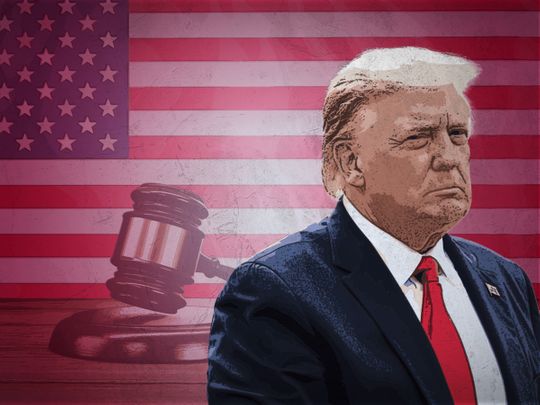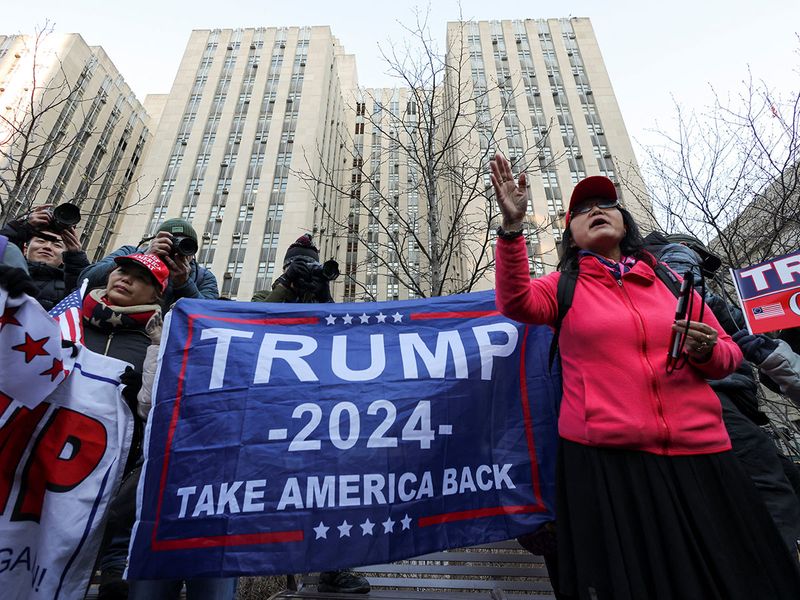
Former US President Donald Trump is expected to appear in court on Tuesday afternoon, the first former US president to be indicted.
A grand jury convened by Manhattan District Attorney Alvin Bragg, who had been investigating Trump’s role in hush money payments made to porn star Stormy Daniels during the 2016 presidential campaign, determined that there was enough evidence to bring criminal charges against him.
At least one of the charges filed against Trump is a felony, reported the Associated Press, citing people familiar with the matter, which ostensibly increases the risk of prison time the former president might face if he is eventually convicted.

A partisan attack?
Trump, who is running for the Republican nomination for next year’s presidential race, has denied any wrongdoing and called the probe and the indictment a partisan attack.
In the US political hypocrisy always comes in duelling versions. Republicans who chanted “Lock her up!” about Hillary Clinton in 2016 are now complaining that Manhattan District Attorney Alvin Bragg’s prosecution of Donald Trump amounts to weaponising the law against political opponents. Democrats who saw authoritarianism in that chant are now eager to see Trump’s mug shot.
The Democrats were right the first time, and in coming years they may regret changing their minds about summoning voter pressure to prosecute political opponents. Short of being written on Biden campaign letterhead, this indictment could hardly be more nakedly political.
Just as Trump repeatedly urged legal action against his enemies, Bragg campaigned on his willingness to pursue the ex-president in court.
If the indictment, which remains sealed, takes the form that Bragg’s office has been talking about for years, it is less a legal case than a magic trick for Trump-haters: Watch me make this statute of limitations disappear, turn this misdemeanour into a felony and try a federal offence in a state court. Bragg himself hesitated to bring these charges until he received public pressure to do it.
When people want to justify questionable legal action against hated figures, the go-to example is Al Capone’s imprisonment for tax fraud. But the case that the Chicago mobster hadn’t paid taxes on hundreds of thousands of dollars in income was open and shut, a serious offence punished by the proper authorities. The case against Trump is far weaker.
An unappealing presidency
The speculation about the political effects of Bragg’s act is mostly pointless. Maybe Republican primary voters will be so angry about the flimsy charges that they rally to Trump — although paying an adult star to keep quiet, the alleged underlying conduct, is not exactly a good reason to make someone president.
Maybe, on the other hand, the prosecution will make Trump’s candidacy even more self-involved and unappealing than before.
It’s the long-term effect on our politics that is most worrisome. If a prosecution that even some of Trump’s critics consider a stretch brings him down, then we can expect more dubious prosecutions of politicians in both parties. District attorneys in deep-red jurisdictions can be just as creative as those in New York.
Republican voters may grow more adamant about demanding it. They could decide that nobody really cares about the civic norms that once inhibited abusive prosecutions — an argument that Bragg has just made more persuasive.
And the lowering of these inhibitions would further degrade our politics and reduce Americans’ faith in the justice system. Public confidence in the mostly impartial administration of the law, especially in cases involving politicians, could suffer long after the 2024 elections.
That’s not the “death and destruction” that Trump, with characteristic irresponsibility, forecast as a result of an indictment. It is, rather, decay and decline: an accelerated loss of trust and trustworthiness in our political and legal systems.
James Madison warned that Americans could not take for granted that elected officials would overcome our divisions: “Enlightened statesmen will not always be at the helm.” Fair enough. But do they have to be nowhere in sight?
Washington Post
Ramesh Ponnuru is the editor of National Review and a fellow at the American Enterprise Institute.










